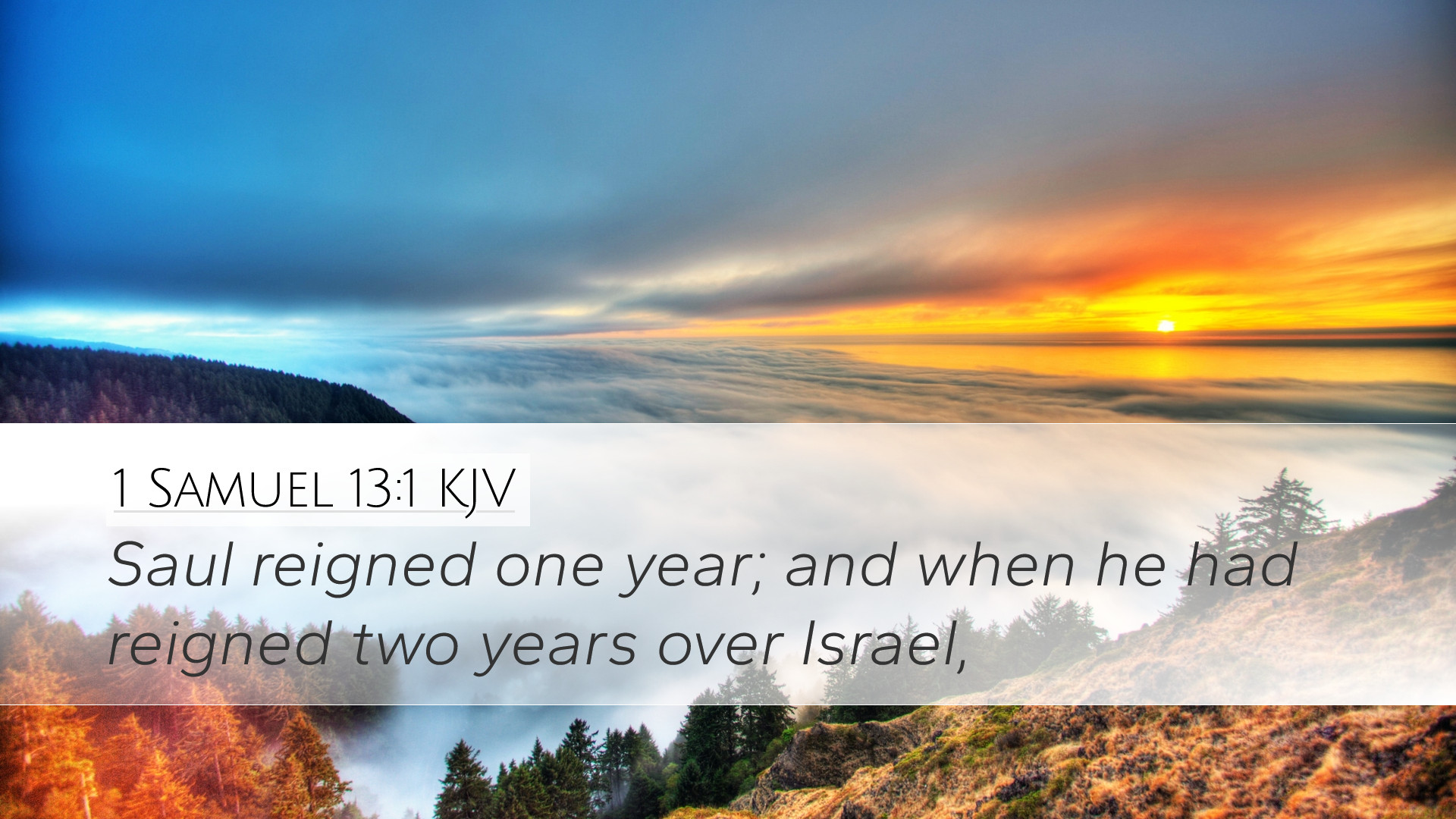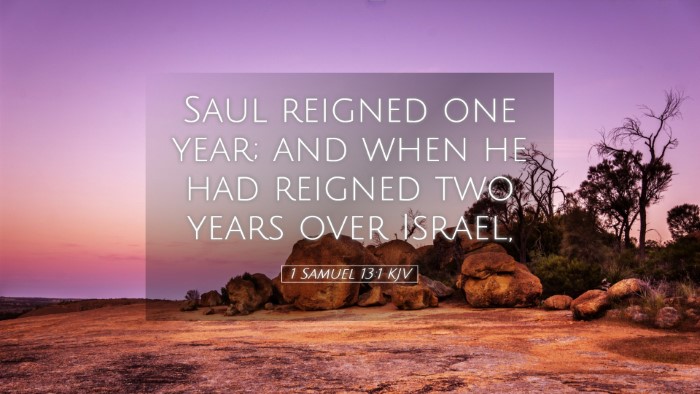Commentary on 1 Samuel 13:1
Verse: 1 Samuel 13:1 - "Saul reigned one year; and when he had reigned two years over Israel,
This verse begins a critical chapter in the narrative of King Saul's reign over Israel. It is a succinct statement that sets the stage for the events that follow, representing a crucial transition in the history of Israel.
Contextual Overview
Historical Background: Saul was chosen by God to be the first king of Israel, a request from the people who desired to be like other nations. His kingship was marked by early promise but soon deteriorated under pressure, showcasing a blend of divine selection and human frailty. In this verse, we see a snapshot of his early reign which needs to be interpreted in light of the subsequent unfolding of his character and leadership.
Insights from Public Domain Commentaries
Matthew Henry
Henry emphasizes the brevity of Saul's early reign, observing that the text provides only a hint of his time in power before significant events take place. He notes that Saul's age at the commencement of his reign and the specifics of his early victories are not detailed, suggesting an intentional silence that may imply the lack of significant accomplishments. Samuel’s initial blessing upon Saul is reflective of God's initial favor, but Henry indicates that this favor would be tested as Saul's reign continued.
- Leadership Lessons: Henry offers that early success can breed complacency, and warns contemporary leaders to remain vigilant even in times of ease.
- Divine Sovereignty: God's hand is evident in the establishment of Saul’s kingship, and this highlights the theme of God working through human choices, a dual narrative that is consistent through scripture.
Albert Barnes
Barnes provides a detailed analysis of the textual implications of this verse. He argues that the chronological marker ("one year... two years") is a signal of the divine timeline, serving to place Saul's reign within the broader narrative of Israel's history. Barnes notes that, although initially this reign is marked by some successes, it soon leads to a pivotal moment where Saul’s decisions would have significant consequences.
- Chronological Importance: Barnes emphasizes the importance of understanding the timing of events and their theological implications in God’s plan for His people.
- Narrative Progression: He highlights that the verses that follow illustrate the turning point in Saul's leadership and God's plan, creating anticipation for Saul's ultimate downfall.
Adam Clarke
Clarke reflects on the peculiar noting of Saul’s age and reign length. He suggests that this detail serves to foreshadow the instability that would come with Saul’s reign and hints at the socio-political environment of Israel. He provides contextual analysis, noting the pressures on Saul from both within and outside, leading him towards decisions that would contradict the divine mandate.
- Socio-Political Commentary: Understanding the environment of Israel at the time is crucial; Clarke insists that the transition from judges to monarchy was fraught with challenges, not only from external foes but also from internal dissent.
- The Nature of Kingship: Clarke emphasizes the complexities of God’s choice in Saul as king, suggesting that God uses imperfect vessels to fulfill divine purposes, a theme that resonates throughout biblical history.
Theological Reflections
This verse serves as a prompt for deeper theological reflection on leadership and the nature of obedience to God. The character of Saul is a compelling study of how initial divine favor may not assure lasting success without genuine faithfulness and active obedience to God’s commands.
- The Role of Obedience: Theological underpinnings highlight that it is not enough to start well; rather, the longevity of one’s leadership and relationship with God rests on continued faithfulness.
- Divine Providence: The juxtaposition of God's sovereign choice and human accountability stands out as a crucial doctrinal point; believers today must navigate this tension in their own faith journeys.
Applications for Today
For pastors, students, and theologians, 1 Samuel 13:1 serves as a gateway to discussions about leadership, divine calling, and the importance of aligning one's actions with God’s will. Contemporary leaders can draw lessons from Saul's early reign as they journey through their own challenges and responsibilities.
- Leadership Vigilance: This verse challenges current leaders to remain prayerful and responsive to God, ensuring that their leadership is rooted in divine wisdom and guidance.
- Caution Against Complacency: Both leaders and congregants must remain cautious against the pitfalls that often accompany early successes, guarding against pride and premature self-reliance.
Conclusion
In summary, 1 Samuel 13:1 encapsulates a crucial moment in the history of Israel, setting the stage for the complex narrative of Saul's reign. Through the observations of ancient commentators like Matthew Henry, Albert Barnes, and Adam Clarke, modern readers are beckoned to engage with the text meaningfully, drawing out timeless truths that challenge and inspire ongoing faithfulness in leadership and discipleship.


